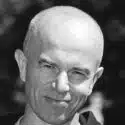Mat Oxley: The promise of Rossi's mediocre first international season
“In 1995, Rossi was like most teenage hotshots, just mucking around”
Twenty-five years ago Valentino Rossi had recently completed his first season of international racing. Between May and October of 1995, the 16-year-old had contested the European 125cc championship, not only failing to win the title but failing to win a single race.
The European championships were the final step of the ladder before grand prix racing. Each year the top three finishers
in each category were guaranteed a place on the grid in the following year’s world championships. In 1995 Rossi was like most teenage hotshots: riding on natural ability, not thinking too much, making plenty of mistakes and generally just mucking around.
“At first it was quite difficult,” recalls his crew chief Mauro Noccioli. “We had to be careful not to put too much pressure on him. He loved riding the bike, but when he was off the bike he wanted to play around on his bicycle and on his PlayStation. We realised we had to let him do all of that, because this life needed to be fun for him.”
“I’d wait for Valentino to attack me here, but he’d pass me there”
Some people already had high hopes for Rossi. The previous autumn he had signed with Aprilia, a small Italian motorcycle manufacturer that punched very much above its weight during bike racing’s two-stroke era.
Rossi had been recommended to Aprilia racing director Carlo Pernat by his father Graziano, a factory grand prix rider with Suzuki, Yamaha and Morbidelli in the 1970s and 1980s. Pernat first saw Rossi in action at Misano in 1994.
“He was unbelievable!” Pernat remembers. “Many times he ran off the circuit, then he would come back and go even faster. I was thinking to myself, ‘Carlo, this is strange, he is either a great champion or a nothing!’ Finally I decided, this is a very strong rider!
“So I went to see Ivano Beggio [founder and president of Aprilia] and told him I wanted to make a three-year contract with Valentino, paying him 30m lire in 1996, 60m in 1997 and 180m in 1998 [from £12,000 to £75,000], whether he won or lost. Beggio told me, ‘You are crazy, we don’t know Valentino!’ I spent half an hour convincing him.”
The start of Rossi’s first international season was erratic, to say the least. He twice finished on the podium in the first half of the 11-race championship and twice crashed out.
His main rival throughout was fellow countryman Lucio Cecchinello, now owner of the LCR Honda MotoGP team. Cecchinello is 10 years Rossi’s senior, so he had more experience and better race craft, as well as a better motorcycle and tyres.
“We had many strong battles at the beginning of races, but then he dropped back because my tyres were better than his,” says Cecchinello, who dominated the series, winning eight rounds. “After one race, I looked at his bike and saw that his tyres were completely destroyed. I thought, ‘How is it possible that this guy can finish just a few seconds behind me with tyres like this?’ That was unbelievable to me and it explains why he is so good at finding the right feeling with a motorcycle.
“The other big thing about Valentino was that he was so unpredictable when you raced with him. Usually when you ride with another rider you more or less understand where he will attack. Maybe you know he will attack at that corner, because you can see he has better grip there, but Valentino was unpredictable. I’d wait for him to attack me here, but instead he would pass me there, where he hadn’t shown that he was stronger. Even then it was clear to me that he was a genius. He had a great talent, but honestly, I didn’t expect that he would already be fast enough to win a GP in 1996.”
As the season progressed Rossi became more and more desperate to get the better of his older rival. “I was always racing with Cecchinello,” he remembers. “Cecchinello had an HRC-kitted Honda RS125 which was impossible to beat, but I wanted to beat him, so I’d go, go, go! After I’d crash, crash, crash!”
Then, on the Assen circuit, they collided while duelling for victory.
“Valentino crashed a lot at that time because he was really pushing,” adds Cecchinello. “I remember one big fight with him [at Assen]. I closed the door on him quite hard and he crashed, damaging a finger badly. He says that whenever he looks at that finger he still thinks about me!”
Even then, one of Rossi’s greatest strengths was that he learned from his mistakes, so during the second half of the season he found some consistency. He took four podium finishes from five races, thereby making sure of that vital top-three championship finish, which secured him a place on the 1996 125cc grid.
The championship finale took place during the weekend of the season-ending Catalan grand prix at the Barcelona circuit. Once again Rossi and Cecchinello disputed the lead, Rossi determined to score his first international victory. It was not to be. Five laps from the chequered flag his Aprilia coughed and died due to a faulty sparkplug.
Rossi’s 1995 performance was mostly mediocre, so when he commenced his rookie grand prix season in March 1996 there was little expectation of greatness. That all changed five months later when he won his first grand prix, at Brno in Czechoslovakia. From that moment the only way was up.

